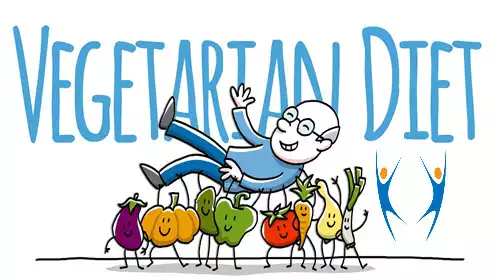Vegetarian Diets Mental Health Dangers
Are you considering adopting a vegetarian diet for its perceived health benefits?
While there is no denying the positive impact of plant-based diets on physical health, recent studies are revealing a potential downside when it comes to mental health.
It has long been believed that vegetarianism can improve one’s mental well-being, but emerging research suggests that it may actually increase the risk of certain mental health issues.
This revelation has sparked a heated debate among experts and individuals practicing vegetarianism.
In this article, we will delve into the findings of these studies and explore the potential dangers that vegetarian diets may pose to mental health.
Whether you are a vegetarian or contemplating the switch, it is important to educate yourself on all aspects of this lifestyle, including its potential impacts on mental health.
So, let us take a closer look at the evidence and what it could mean for those following a vegetarian diet.
Table of Contents Vegetarian Diets Mental Health Dangers
Consider adding meat to diet.
When looking at the potential impact of diet on mental health, it is important to consider the role of meat consumption.
While vegetarian diets have gained popularity for various reasons, it is worth noting that incorporating meat into your diet can provide essential nutrients that support mental well-being.
Meat is a rich source of important nutrients like vitamin B12, iron, zinc, and omega-3 fatty acids, which have been linked to improved brain function and mood regulation.
Additionally, studies have shown that individuals following vegetarian diets may be at a higher risk for nutrient deficiencies that can negatively affect mental health.
It is therefore advisable to consider including meat in your diet to ensure a well-rounded intake of vital nutrients that support optimum mental health.
Limit processed vegetarian options.
To optimize the benefits of a vegetarian diet on mental health, it is recommended to limit processed vegetarian options.
While it may seem convenient to rely on packaged vegetarian alternatives, such as meat substitutes or pre-packaged meals, these products often contain additives, preservatives, and high levels of sodium.
Consuming excessive processed foods can have negative effects on your overall health and mental well-being.
Instead, focus on incorporating fresh fruits, vegetables, whole grains, legumes, and nuts into your diet.
These natural, unprocessed foods provide a wide range of essential nutrients and antioxidants that support brain function and mood stability.
By choosing whole, unprocessed vegetarian options, you can enhance the positive impact of your diet on mental health.
Monitor nutrient intake carefully.
When following a vegetarian diet, it is crucial to monitor your nutrient intake carefully to ensure that you are meeting your body’s nutritional needs.
While vegetarianism can offer numerous health benefits, inadequately planned vegetarian diets can lead to deficiencies in essential nutrients.
Pay particular attention to nutrients commonly found in animal products, such as vitamin B12, iron, zinc, and omega-3 fatty acids.
These nutrients play vital roles in brain function and mood regulation.
To ensure proper nutrient balance, consider consulting with a registered dietitian or nutritionist who specializes in vegetarian diets.
They can help develop a personalized meal plan that addresses your specific nutritional needs and ensures that you are obtaining adequate amounts of all essential nutrients.
By monitoring your nutrient intake carefully, you can maintain a healthy and balanced vegetarian diet that supports optimal mental health and well-being.
Seek professional advice if necessary.
To ensure that you are maintaining a healthy and balanced vegetarian diet, it is important to seek professional advice if necessary.
While vegetarian diets can provide numerous health benefits, it is essential to consult with a registered dietitian or nutritionist who specializes in vegetarian diets.
They have the expertise to assess your specific nutrient needs and can provide personalized guidance to help you meet those needs through your dietary choices.
Seeking professional advice can also help in addressing any concerns or potential risks associated with vegetarian diets and mental health, as revealed by some studies.
By working with a professional, you can confidently navigate the complexities of vegetarian diets and ensure that you are prioritizing both your mental health and overall well-being.
Be aware of potential deficiencies.
In addition to seeking professional guidance, it is important to be aware of potential deficiencies that may arise from a vegetarian diet.
While vegetarian diets can be rich in nutrients, certain essential nutrients may be lacking if not carefully planned.
For example, vegetarians may have a higher risk of deficiencies in nutrients such as vitamin B12, iron, zinc, and omega-3 fatty acids.
These nutrients play crucial roles in mental health and overall well-being.
To mitigate this risk, it is important to incorporate a variety of plant-based foods that are rich in these nutrients or consider fortified options or dietary supplements as recommended by a healthcare professional.
Being mindful of potential deficiencies and taking proactive steps can help ensure that you are supporting your mental health while following a vegetarian diet.
Incorporate variety in meals.
To support optimal mental health while following a vegetarian diet, it is essential to incorporate variety in your meals.
By diversifying your food choices, you can ensure a wide range of nutrients that are vital for mental well-being.
Include a variety of fruits, vegetables, whole grains, legumes, nuts, and seeds in your diet to obtain different vitamins, minerals, and antioxidants.
Experiment with different cooking methods and flavor profiles to keep your meals interesting and satisfying.
Additionally, try incorporating different types of vegetarian proteins, such as tofu, tempeh, lentils, and quinoa, to ensure you are getting a complete amino acid profile.
By embracing variety in your meals, you can enhance both the nutritional value and enjoyment of your vegetarian diet, promoting overall mental health and well-being.
Don’t rely on supplements alone.
While it can be tempting to rely solely on supplements to meet your nutritional needs on a vegetarian diet, it is important to remember that they should not be used as a substitute for a well-balanced and varied diet.
While supplements can help fill in nutrient gaps, they do not provide the same benefits as whole foods.
Whole foods contain a combination of nutrients, fiber, and phytochemicals that work synergistically to support overall health.
Additionally, some studies have revealed that relying too heavily on supplements may not provide the same mental health benefits as a diverse and nutrient-rich diet.
Therefore, it is recommended to focus on obtaining nutrients from a wide range of plant-based sources to support optimal mental health and minimize the potential dangers associated with solely relying on supplements.
Pay attention to mood changes.
It is essential to pay attention to mood changes when following a vegetarian diet.
While vegetarian diets have been shown to have numerous health benefits, including a reduced risk of chronic diseases, it is important to understand the potential impact on mental health.
Research has indicated a potential link between vegetarian diets and certain mental health concerns, such as an increased risk of depression and anxiety.
This association may be attributed to various factors, including nutrient deficiencies, inadequate intake of certain essential amino acids, and imbalances in neurotransmitters.
To mitigate these risks, it is crucial to prioritize a well-rounded vegetarian diet that incorporates a diverse array of plant-based proteins, whole grains, fruits, vegetables, and healthy fats.
Additionally, it is advisable to consult with a healthcare professional or registered dietitian to ensure you are meeting your nutritional needs and to address any potential mood-related concerns.
By being mindful of mood changes and taking proactive steps to maintain a balanced diet, you can promote both physical and mental well-being on a vegetarian diet.
Listen to your body’s needs.
When following a vegetarian diet, it is important to listen to your body’s needs and make necessary adjustments.
Each individual’s nutritional requirements may vary, and it is essential to be mindful of any symptoms or changes in mental health that may arise.
If you notice any mood changes, fatigue, or other signs of nutrient deficiencies, it is crucial to address them promptly.
This may involve incorporating a wider variety of plant-based protein sources, considering supplementation for certain nutrients, or consulting with a healthcare professional or registered dietitian for personalized guidance.
By being attentive to your body’s signals and making informed choices, you can maintain a balanced vegetarian diet that supports both your physical and mental well-being.
Prioritize balanced meals for health.
To support your overall health, it is crucial to prioritize balanced meals in your vegetarian diet.
By doing so, you ensure that you are providing your body with an array of nutrients necessary for optimal functioning.
Aim to include a variety of fruits, vegetables, whole grains, legumes, and plant-based proteins in your meals.
These foods are rich in essential vitamins, minerals, and antioxidants that contribute to mental well-being and overall vitality.
Incorporating a mix of different food groups will help ensure that you are getting a diverse range of nutrients, including iron, vitamin B12, omega-3 fatty acids, and zinc, which are commonly found in animal-based products.
Planning your meals in advance and being mindful of portion sizes can help you maintain a balanced and nourishing vegetarian diet.
Remember to also prioritize hydration and make water your go-to beverage throughout the day to support your body’s overall health and well-being.
In conclusion, it is important to consider the potential risks and benefits of a vegetarian diet on mental health.
While some studies have shown a link between vegetarianism and increased risks of depression and anxiety, it is important to remember that everyone’s body and dietary needs are unique.
If you are considering a vegetarian diet, it is important to consult with a healthcare professional to ensure you are still getting all the necessary nutrients for both physical and mental well-being.
Ultimately, the decision to follow a vegetarian diet should be based on individual needs and preferences, taking into account all available information and seeking guidance from a medical professional.
FAQ
What specific mental health dangers have been revealed by studies regarding vegetarian diets?
When following a vegetarian diet, you may face potential mental health risks that have been uncovered by studies.
These dangers include an increased risk of nutrient deficiencies, such as vitamin B12 and omega-3 fatty acids, which are essential for brain health.
Additionally, some studies suggest that vegetarians may be more prone to developing mood disorders like depression and anxiety.
It is important to ensure you are incorporating a variety of plant-based sources to meet your nutritional needs and consider consulting a healthcare professional to address any concerns or potential risks.
How do vegetarian diets potentially contribute to an increased risk of mental health issues?
As a vegetarian, your diet may potentially contribute to an increased risk of mental health issues.
This is because certain nutrients essential for brain health, such as omega-3 fatty acids and vitamin B12, are mainly found in animal products.
Without a proper intake of these nutrients, you might experience imbalances that can negatively impact your mental well-being.
It’s crucial for you to carefully plan your diet to ensure you’re getting enough of these nutrients through plant-based sources or supplements.
Additionally, being mindful of your overall nutrient intake and seeking professional advice can help minimize the potential risks to your mental health.
Are there any specific nutrients or vitamins that are lacking in vegetarian diets, which may impact mental health?
In a vegetarian diet, there may be a potential lack of specific nutrients or vitamins that could impact your mental health.
One nutrient to pay attention to is vitamin B12, typically found in animal products.
This vitamin is essential for brain health and the production of red blood cells.
Another nutrient to consider is omega-3 fatty acids, commonly found in fish.
These fatty acids play a crucial role in brain function and may help reduce the risk of mental health disorders.
To ensure you’re meeting your nutritional needs, consider incorporating fortified foods or supplements into your vegetarian diet.
Consulting with a healthcare professional or registered dietitian can provide further guidance.
Have these studies taken into account other factors, such as lifestyle or pre-existing mental health conditions, that could potentially influence the results?
Yes, you should be aware that these studies have indeed considered other factors, including lifestyle choices and pre-existing mental health conditions, which could potentially impact the outcomes.
It is essential to understand that researchers have taken a comprehensive approach, ensuring that all relevant variables are taken into account to obtain accurate and reliable results.
By considering these factors, the studies aim to provide a more complete understanding of the relationship between the variables under investigation, ultimately contributing to a more informed and nuanced understanding of the topic.
Are there any potential benefits of vegetarian diets for mental health that have been overlooked in these studies?
Yes, there are potential benefits of vegetarian diets for mental health that have been overlooked in these studies.
By adopting a vegetarian diet, you can increase your intake of fruits, vegetables, and whole grains, which are rich in essential nutrients like antioxidants and fiber.
These nutrients have been linked to improved mental well-being and reduced risk of depression and anxiety.
Additionally, choosing a vegetarian lifestyle promotes mindfulness and ethical values, which can positively impact your mental health.
So, don’t overlook the potential mental health benefits of a vegetarian diet as you strive for overall well-being.







